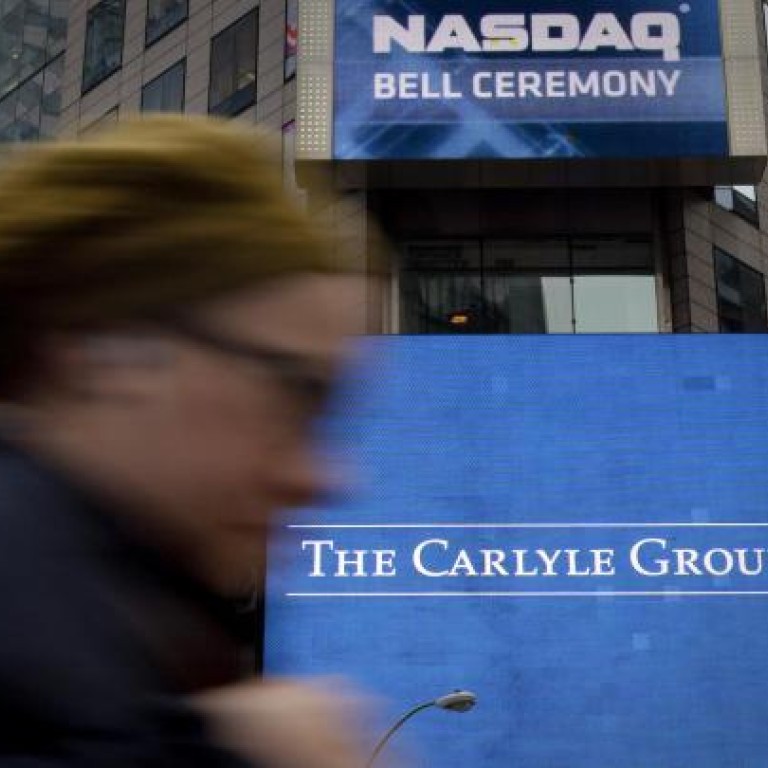
Exclusive: 'Princeling' firm holds secret stake in giant fund house Cinda
As jostling starts over the stock market float of Cinda Asset Management, details have come to light of two previously unknown stakeholders
With the giant state-owned fund house Cinda Asset Management planning to go public in Hong Kong this year, two behind-the-scenes investors in the company, including a private equity fund co-founded by the grandson of China's former state head Jiang Zemin, have been pushed into the spotlight.

In March 2012, Cinda brought in three new so-called strategic investors - UBS, Citic Capital, an investment firm partly owned by China Investment Corp, the mainland's US$300 billion sovereign wealth fund, and Standard Chartered - in a deal worth around US$1 billion, for a combined stake of less than 10 per cent in the business.
What surprised the financial community more was the discovery later that after that deal, Washington-based private equity firm the Carlyle Group, and Boyu Capital, a billion-dollar private equity firm based in Hong Kong and partly funded by Li Ka-shing, Asia's richest man, each struck deals to become the ultimate holders of their own stakes in Cinda.
Two of the three sources familiar with the matter told the that UBS sold part of its holdings in Cinda, which the Swiss bank obtained through its direct investment in 2012, to Carlyle, one of the world's largest private equity firms.
Boyu also made a sophisticated financial arrangement with Citic Capital to obtain part of the stake in Cinda originally held by Citic, sources said.
Financial details such as the size of the stakes in Cinda that Carlyle and Boyu indirectly own remain unclear. On the record, UBS, Standard Chartered, and Citic Capital remain as Cinda's three new shareholders. The rest of Cinda is owned by the Chinese government.
One of the anonymous sources said: "It may be a bit controversial if you just publicly tell everyone that two offshore funds like Boyu and Carlyle made direct investments in a company like Cinda.
"That explains why they chose to make such investments off the record and through indirect channels."
The indirect investments by Carlyle and Boyu in Cinda were kept secret for some time within a small group of relevant people.
However, earlier this year, when more than a dozen investment banks began to pitch to Cinda over its plan for a US$3 billion listing in Hong Kong, the behind-the-scenes roles of Carlyle and Boyu in Cinda were spotted by some bankers and the word started to spread in Hong Kong's financial community.
Such behind-the-scenes investments have grown more popular in recent years in the mainland's fast-growing private equity business, where government relations are often the key to deal-making.
In 2008, Carlyle failed to buy into a major Chinese machinery maker because it could not get government approval: Carlyle's target was considered by Beijing at the time to be strategically important to the country's national security.
Boyu said it would not comment on the firm's specific investments. Carlyle did not reply to the inquiries.
Cinda is a legacy of Beijing's efforts to clean up nation's bad-loan crisis in the 1990s, and it also helped to improve the financial books of the Big Four state-owned banks on the mainland before they went public.
Given Cinda's strategic importance to the mainland's financial security, Beijing will usually not welcome foreign private equity firms buying into such state-owned firms.
Jiang Zhicheng, born in Shanghai and educated at Harvard, the grandson of form- er president Jiang Zemin, is a co-founding member of Boyu.
He started his career at Goldman Sachs as a junior investment banker and later teamed up with big names including Mary Ma, the former chief finance officer of the Chinese computer maker Lenovo, to set up Boyu.
Many sons and daughters of senior Chinese officials, known as "princelings", studied abroad and later returned to China to launch their own investment firms.
Winston Wen, the son of the former premier Wen Jiabao, studied at the Northwestern University in the US and later returned to China to co-found New Horizon Capital.
Wen junior left the firm some years ago due partly to growing public concern over the conflict between his private equity job and his father's high position in government.
A source close to the younger Jiang, now in his late 20s and based in Hong Kong, said he was "a very smart and nice young person. Unlike many other princelings, he has tried very hard to keep a low profile".

